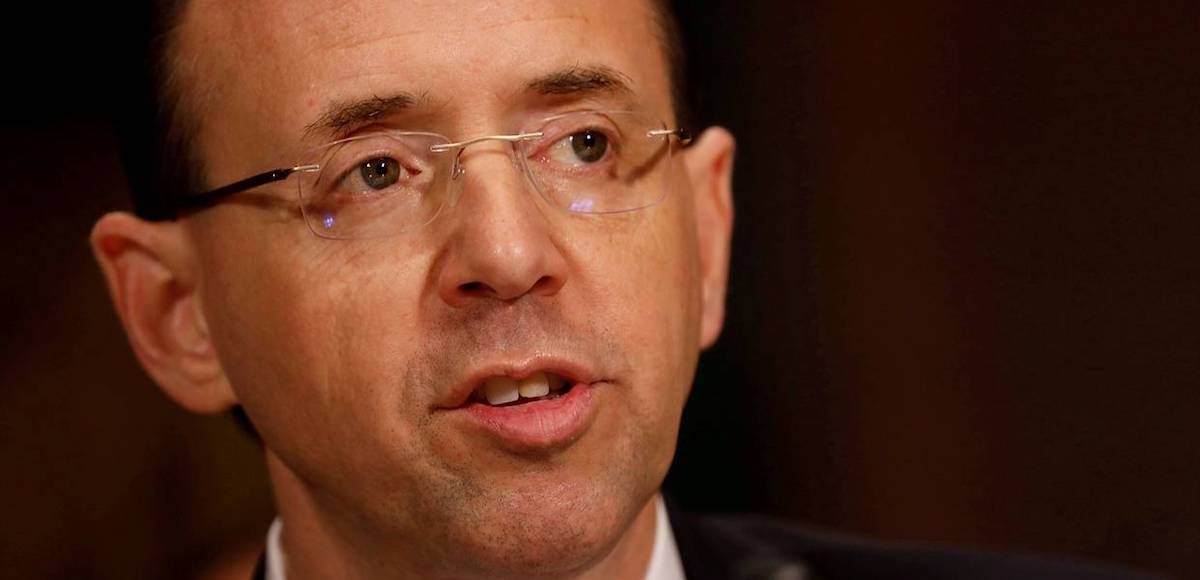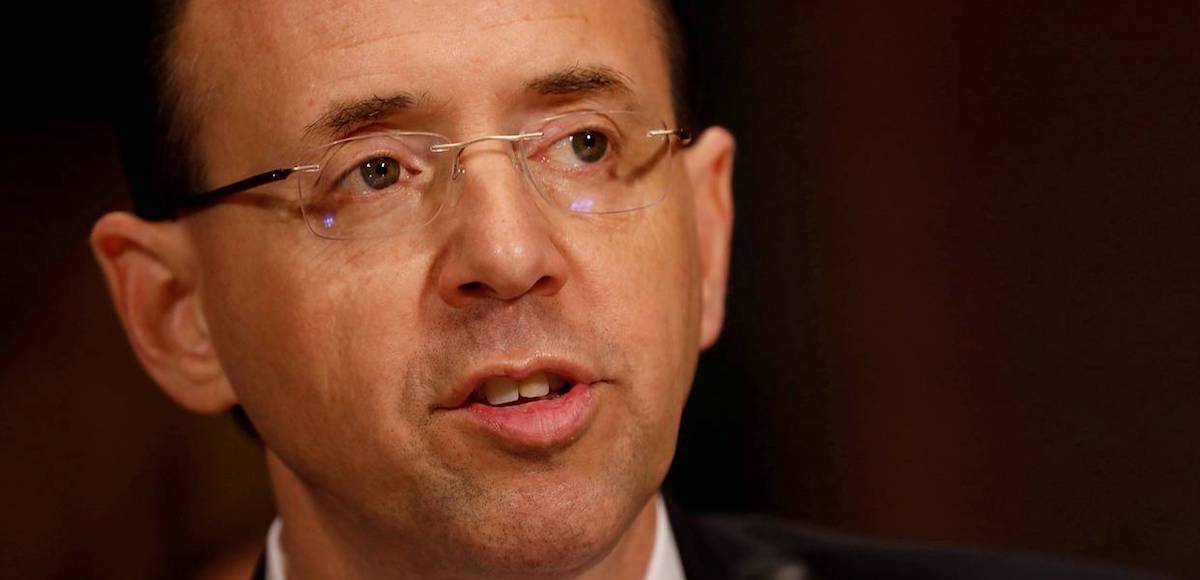
Sources: Deputy Attorney General Rosenstein Said During Meeting in January He Would Subpoena Members’ Phone Records

Rod Rosenstein, nominee to be Deputy Attorney General, testifies before the Senate Judiciary Committee on Capitol Hill in Washington March 7, 2017. (Photo: Reuters)
Deputy Attorney General Rod Rosenstein threatened to subpoena phone records belonging to members of the House Permanent Select Committee on Intelligence (HPSCI) if they continued to investigate abuses of government surveillance programs, multiple sources confirm.
That threat included HPSCI Chairman Devin Nunes, R-Calif., himself.
Multiple sources confirmed to People’s Pundit Daily (PPD) that Mr. Rosenstein expressed his frustration with the committee’s oversight investigation during a meeting that took place on January 10. Federal Bureau of Investigation (FBI) Director Christopher Wray, Chairman Nunes and several others were present at the meeting.
Mr. Rosenstein said he was done “dealing with the intelligence committee” investigation and threatened to subpoena call and text message records belonging to Chairman Nunes and other HPSCI members.
The meeting in question took place before the highly-anticipated release of a memo prepared by Chairman Nunes and Republicans on the intelligence committee, which details FISA abuses by Mr. Rosenstein, former FBI director James Comey, the just ousted FBI Deputy Director Andrew McCabe and other former Obama Administration officials.
These officials used false information to obtain a FISA warrant to spy on Team Trump via peripheral advisors Carter Page and (later) George Papadopolous. Last week, Mr. McCabe was “removed” from his post at the FBI amid conflicts of interest and ongoing investigations of misconduct.
Section 702 of the Foreign Intelligence Surveillance Act (FISA) allows intelligence agencies to collect information on foreign targets abroad. However, as PPD also previously reported, it has been “routinely” abused and misused to spy on domestic targets, including President Trump, his associates and other U.S. citizens.
In this case, the memo reveals the use of what is known as circular reporting — a cardinal sin in the intelligence community. A Yahoo News article based on the contents of the unverified dossier was used to lend credibility to the allegations in the still-unverified dossier. At the time, officials were aware that the allegations made in the dossier were not verified.
The FISA court was not explicitly made aware that the dossiers were political opposition research funded by the Democratic National Committee (DNC) and the campaign for Hillary Clinton.
Bank records obtained by the HPSCI probe show Fusion GPS, the shadowy smear firm hired by Clinton lawyer Marc E. Elias of Perkins Coie, made payments to at least 3 journalists known for covering Russian collusion stories. Yahoo News is cited as one of the news outlets “briefed” on the Kremlin-sourced dossier authored by former MI6 British Intelligence Officer Christopher Steele.
Senators Chuck Grassley, R-Iowa, and Lindsey Graham, R-S.C., sent a a criminal referral to Mr. Rosenstein and FBI Director Christopher Wray to investigate Mr. Steele, citing potential violations of 18 U.S.C. § 1001, or making false statements to investigators particularly regarding the distribution of claims contained in the dossier.
But Mr. Rosenstein fought tooth and nail to keep the memo secret, claiming it would damage national security by exposing sources and methods. According to sources, the January 10 meeting was not the only time the deputy attorney general told lawmakers there would be consequences for continuing the investigation or for releasing the memo.
In a meeting with House Speaker Paul Ryan, R-Wis., which took place in the speaker’s office before the memo was released, Mr. Rosenstein attempted to convince the man who is third in line to the presidency to call off Chairman Nunes and to suppress the release of the memo.
Speaker Ryan refused and the memo was released on Friday.
It did not contain anything damaging to national security. But it did damage the reputation and credibility of the leadership at the FBI and DOJ, including Deputy Attorney General Rosenstein.
Under Title 18, U.S.C., Section 242, it’s a crime for law enforcement officials acting under “color of any law to willfully deprive a person of a right or privilege protected by the Constitution or laws of the United States.”
That includes threatening a lawmaker or lawmakers.
In this case, multiple sources allege that Mr. Rosenstein was specifically attempting to obstruct or end the HPSCI probe into wrongdoings at the FBI and DOJ.
For the purpose of Section 242, acts under “color of law” include acts not only done by federal, state, or local officials within the their lawful authority, “but also acts done beyond the bounds of that official’s lawful authority, if the acts are done while the official is purporting to or pretending to act in the performance of his/her official duties.”
Deputy Attorney General Rosenstein appointed Special Counsel Robert Mueller against DOJ policy and the laws governing special counsels.
Section II(c) of the DOJ Government Ethics Outline demands, “No DOJ employee may participate in a criminal investigation or prosecution if he has a personal or political relationship with any person or organization substantially involved in the conduct that is the subject of the investigation or prosecution, or who would be directly affected by the outcome.”
28 USC Section 528 requires “the disqualification of any officer or employee of the Department of Justice, including a United States attorney or a member of such attorney’s staff, from participation in a particular investigation or prosecution if such participation may result in a personal, financial, or political conflict of interest, or the appearance thereof.”
“Such rules and regulations may provide that a willful violation of any provision thereof shall result in removal from office.”
The Department of Justice (DOJ) did not immediately respond to a request for comment.








#ReleaseTheMemo / February 4, 2018
Amazing display of how the UNELECTED bureaucrats control the elected officials who are accountable… https://t.co/NDU7dhv2Ww
/
The Reckoning ? / February 4, 2018
What are the odds that this is either fake news or a purposeful ruse to make it seem Rosenstein opp… https://t.co/E0PhphBIUd
/
Karen / February 4, 2018
Explain to me how @TGowdySC can toot this guy’s horn, especially after he knew abt Fisa and now thr… https://t.co/pnUpdoi2YK
/
Craig Crawford / February 4, 2018
Come on let’s see who is dirtier!
/
Bear / February 4, 2018
If true, ethics violation complaints should be lodged against Rosenstein by congressional members.… https://t.co/jtEB6X10I0
/
Kriss Doerner / February 4, 2018
fire him
/
rob l / February 4, 2018
@fbi @DCPoliceDept @CapitolPolice time to step up to the plate.
/
Terry Hood / February 4, 2018
Why is this not a bigger story and pursued by the Republicans on the committee?
/
Maga Mike / February 4, 2018
What is my dude Jeff Sessions doing? What do they have on him?
/
g / February 4, 2018
My my but this egotist wields such power—kind of like the wizard behind the curtain. Who else can t… https://t.co/9kWt8HrPIw
/
Goldie Cross / February 4, 2018
Please President Trump…..DRAIN THE SWAMP!
/
Melody Ivers / February 5, 2018
@ColBannister Get rid of him!!!!
/
I Voted 4 Trump ?? / February 5, 2018
@Monica4Trump Ok so now the FBI is threatening the Congressman for doing his job?
/
Popou TX / February 5, 2018
@TruthMatters13 There’s your sign!
/
K David Severance / February 5, 2018
@ColtsPens85 Rosenstein is part of the problem!
/
TJ / February 5, 2018
Now that it is out, if anything happens to Nunes, it is on the records!!!
/
Candice Ralston / February 5, 2018
Rod Rosenstein can go to Prison!
/
Teri Saunders / February 5, 2018
https://t.co/zxhZIEm1Wg
/
Liz ??? / February 5, 2018
He needs to be fired immediately
/
RJ / February 5, 2018
Put the bastard in jail
/
Ken Sirmons / February 5, 2018
Slap the cuffs on his ass ??
/
De Plorabus Unum / February 5, 2018
#ImpeachRosenstein
/
Linda Gilbert / February 5, 2018
#FireRosenstein
/
Lauren Rush ? ?? ✡ / February 5, 2018
@PoliticallyRYT Threatened???????
/
Joyce wrenn / February 6, 2018
Evil little man
/
Nubia Garate / February 7, 2018
He knows what coming into his way, he is afraid ? bc he is implicated in this
/